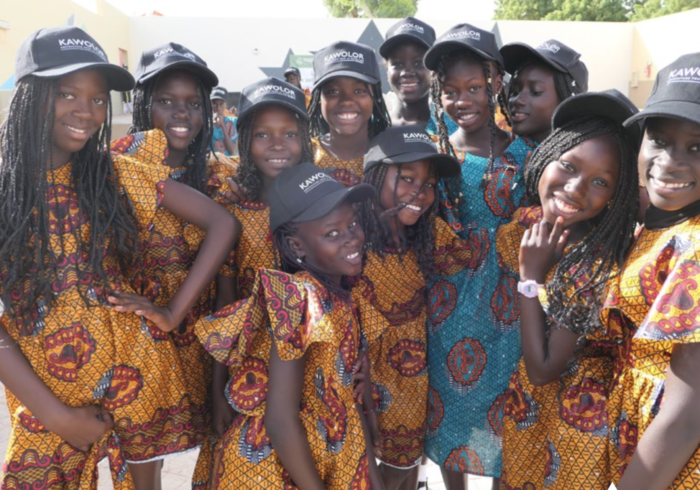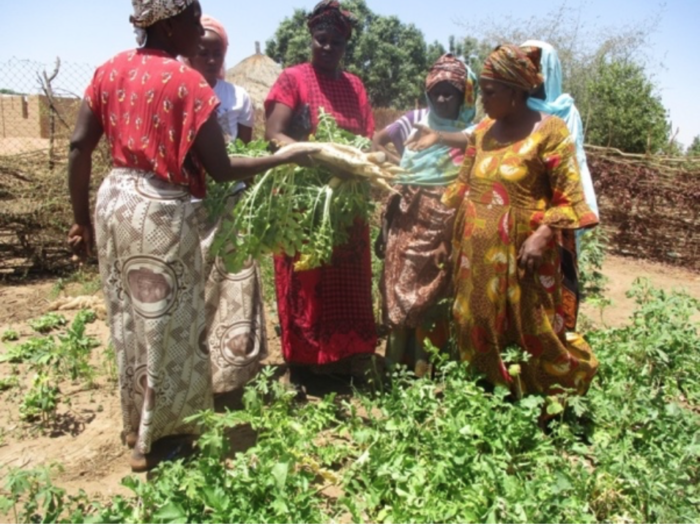
This project aims to curb malnutrition and provide food security to Senegal by empowering organizations and regional resources partners to scale up the Nutrition Led Agriculture (NLA) approach and utilize market opportunities for sustainability. The overall activity objective is to increase within beneficiary communities the production, consumption and commercialization of healthy and nutritious foods while encouraging household level consumption of diverse diets, focused primarily on women of reproductive age and children under two years of age.
Using a “platform approach,” NCBA CLUSA trains and supports local institutions to lead their own community development. This allows communities to sustainably increase consumption of nutritious and safe diets, increase on-farm availability and market supply of diverse, micro-nutrient rich foods, increase resilience and income, increase adoption of nutrition and care practices, and improve the governance of food systems in 3,500 villages across 129 communes in 8 regions—reaching 150,000 households, 500,000 children and 1.5 million people over five years. Key to this approach, NCBA CLUSA will partner with and strengthen local, regional and national private and public sector partnerships including mothers’ groups, Citizen Working Groups, Agriprenuers known as Community Based Solution Providers (CBSPs), private firms and research institutions.
Feed the Future Kawolor is also helping project stakeholders and participants reach the goal of self-reliance through a private sector led approach, linking activities to ongoing market operations and supporting partners to develop relationships. This focus supports building and expanding the network of CBSPs, organized as an independent organization called CultiVert. Kawolor is identifying the broad range of potential partners working in the private sector within its zone of influence (ZOI) that are not yet engaged with the project, such as local and national market chains interested in accessing vegetables and fruit from local producers, as well as firms offering solutions in improved aggregation, transportation and storage of perishable food. CultiVert Solution Providers (CSP) are also key players in Kawolor’s efforts to more fully engage private sector actors and opportunities throughout the ZOI, as they work as agents bringing quality products, services and capacity training from these companies to communities.
Recent Feed the FutureHighlights:
• Facilitating private-sector linkages and contracts between producers and regional and national companies to increase availability of nutritious foods in markets
• Increasing male engagement in the project is essential to ensure sustainability in women’s economic and social empowerment. To address this, the project has implemented a male champions strategy called “essemay,” highlighting positive male role models to lead sensitization, practical demonstrations of supporting wives with decision making.
• Community contributions to finance new or repaired water and irrigation locations for multiple villages
• Introducing micro-finance activities to the Debbo Galle Groups (women’s groups) to increase savings at the household level or for horticultural income generating activities.
A Nutrition Service Provider is Leading Community Change

Barka, 32, is a farmer from Kabacoto, a village located about 300 km southeast of Dakar, Senegal. The eldest in his family, he supports his parents, wife and brothers. After just two years of high school, Barka dropped out to focus on earning an income from farm work. Frustrated by the limited employment opportunities in Kabacoto, he moved to Dakar—first to work as a street vendor, then a salesman. But when a fire destroyed his shop in 2012, Barka returned to his village to try farming again.
Back home, Barka once again faced the harsh realities of life in Kabacoto: poverty, instability and malnutrition—especially for children—are daily battles. Barka wanted something better. He committed to community development, most recently partnering with NCBA CLUSA’s Feed the Future Senegal Kawolor project.
In October 2018, Barka became a Nutrition Service Provider working through the CultiVert franchise in Kabacoto. He was identified for this role by the local Interpenc organization, one of Kawolor’s regional implementing partners. Barka received training on essential nutrition and hygiene practices, micro-gardening, using biofortified crops to produce nutritious enriched flour, and establishing village level food security committees. He also learned to use mobile technology to collect data and monitor the nutritional and health status of women and children. Armed with new skills and motivated by his commitment to transform his village and beyond, Barka established three Debbo Galle, or mothers’ groups, comprised of 20 women each. These groups are driving efforts to curb the malnutrition that affects women, infants and children in the region.
The first activity Barka worked on after establishing Kabacoto’s Debbo Galle groups was to help women develop income-generating activities. “After training the groups in making enriched flour, I suggested they produce and resell it to others as a way to earn money to buy inputs and start a market garden,” he said. The Foyere Lenol Debbo Galle Group was the first to see results.. “They raised 6,000 CFA from flour sales. This money was used to buy seeds. Then, I helped them gain access to a 100 square meter market garden to use during the dry season since the landowner only uses the plot for field crops. After a second sale, each of them contributed 250 CFA to fence in the plot.”
Learning to generate income from gardening is a new innovation for these women. “Prior to this, they each contributed to a savings plan each week, but the gardening and the flour making and selling is entirely new!” Barka said.
Today, the Debbo Galle groups of Kabacoto are growing crops such as turnips, lettuce, tomatoes and peppers for home consumption and local sales. The revenue from these vegetables generated profits of 20,000 CFA—money that is kept in the groups’ savings bank.
To bring nutritious food to the entire village and the surrounding area, Barka developed a partnership in February 2019 with the local clinic, which purchases and distributes the enriched flour. “The head nurse at this clinic is responsible for selling the flour to caregivers of children suffering from moderate acute malnutrition (MAM),” he said.. “I treat 13 children with MAM,” the nurse said, adding that already 12 of the children’s parents have purchased enriched flour for their families at 500 per bag.
With the support of Barka, the cooperative power of these women, their successful market garden and flour business means people in Kabacoto can now enjoy a nutritious, safe and balanced diet. Debbo Galle members have seen their household incomes grow, children are recovering from malnutrition and women are empowered
Convinced that all this is only the beginning, Barka and the Debbo Galle groups of Kabacoto plan to purchase their own land. By growing produce all year and having access to water, they can maximize their profits and continue to impact their community.

